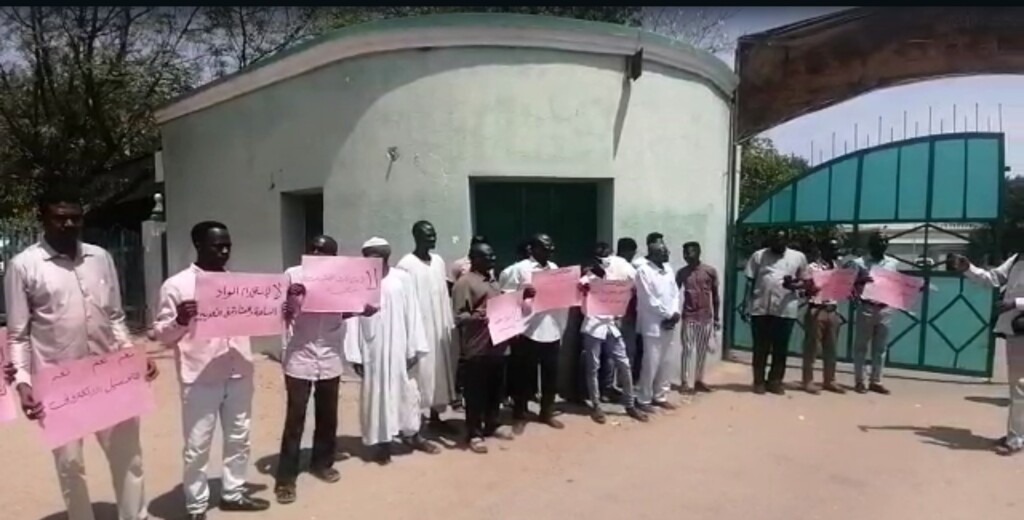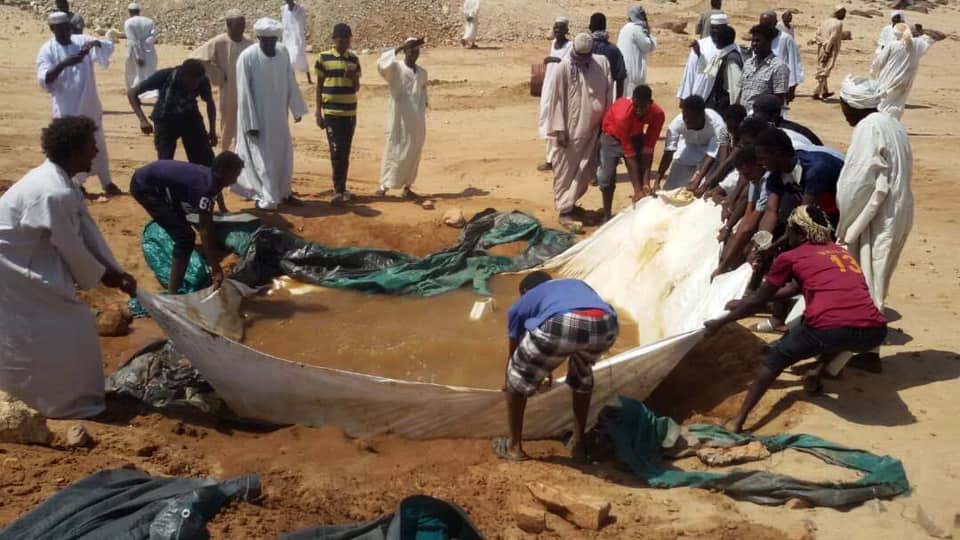Sudan activists stand firm against ‘toxic, monopolistic’ mining practices

Protest in front of the South Darfur government buildings on Monday against the mining practices in the Agbash mine (Photo: Radio Dabanga)
NYALA / DELGO –
South Darfur activists staged a protest vigil in front of the secretariat of the state government in Nyala on Monday, to condemn the practices of the mining company that operates in the Aghbash gold mine in El Radoom.
Hamid Hammad told Radio Dabanga from the vigil that they are against the mining practices of the Al Junaid company, and accused it of “monopolising thousands of kilometres”, calling for opening the area to all companies.
He explained that mining has caused the spread of diseases and the deterioration of the environment, pointing to ponds that violate specifications and mining laws using toxic mercury and cyanide, and called for the use of safe methods.
He accused the Sudanese Mineral Resources Company of lack of transparency in collecting fees, calling for electronic collection.
Northern State
On Monday, a sit-in in Abu Sari in Delgo, Northern State, entered its seventh week, rejecting the mining activities using cyanide and mercury in the area.
Protester Hatem Hasan confirmed to Radio Dabanga the protesters’ insistence on resolving the dispute between them and the Delgo Mining Company through the judiciary, after all attempts to end the dispute between them failed.
He said that the sit-in committee announced the escalation of the protests to the national level, by carrying out a protest vigil in front of the Embassy of Qatar in Khartoum on March 9, with the participation of Nubian king Mohamed Ibrahim Kaboush.
Charges
As previously reported by Radio Dabanga, the Delgo Mining Company is pressing charges against five protesters in Sudan’s Northern State for ‘causing the suspension of a gold mining plant’, which uses the highly toxic cyanide. In response, activists from Abu Sari in Delgo accused the company of not complying with the agreement signed between the local community, the local authorities, and the company itself, which stipulates that the plant should be relocated to a ‘safe distance’.
Sudan has been witnessing various protests against the behaviour of gold mining companies, especially against the environmental and health risks posed by the use of highly toxic chemicals such as cyanide and mercury. Protests are also taking place in Red Sea State, Kordofan, and Darfur.
Environmental and health risks

Environmentalists have been warning of the health and environmental hazards of using toxic mercury and cyanide to extract gold from ore for years. Five years ago, a Sudanese environmental protection expert already warned that the pollution caused by the use of cyanide and mercury in gold mining “constitutes the largest and most dangerous threat to the country’s environment”.
A recent report on mercury poisoning in Sudan points out that “years of indiscriminate use of dangerous chemicals such as mercury, cyanide, and thiourea without protective measures for miners or local populations has exposed millions of citizens across Sudan to lethal risks”.
Throughout the years, there have been plenty of reports of livestock, birds, and fish dying and medical issues amongst humans, such as miscarriages and kidney failure, as a result of environmental pollution caused by gold mining activities.
In 2018, Northern State authorities closed the Sawarda school complex after students suffered from coughing, vomiting, and shortness of breath. The situation was attributed to activities of the International Company for Mining, which spread mining waste and dust in the area.
The Central Bank of Sudan (CBoS) 2022 report on foreign trade states that gold still remains the largest export commodity from Sudan.
The CBoS trade report indicated that Sudan saw its trade deficit lessen from last year’s $4.7 billion deficit to this current year’s deficit of $1.5 billion. The trade deficit reflects Sudan’s import commodities exceeding its exports.
Amid growing concerns of economic and food insecurity in the region, as well as the political crisis currently embroiled in Sudan, the United Nation’s Secretary-General António Guterres stated in a report on September 2 that Sudan is at risk of being “constrained economically” and this will likely “deter investors”.
Sudan is one of the largest producers of gold in Africa, however production is often driven by unregulated, artisanal (individual subsistence) mining, and routine gold smuggling across international borders is a constant problem.
It is estimated that between 50 per cent and 80 per cent of Sudan’s gold is smuggled out of the country, with proceeds frequently used to finance internal conflicts.











 and then
and then